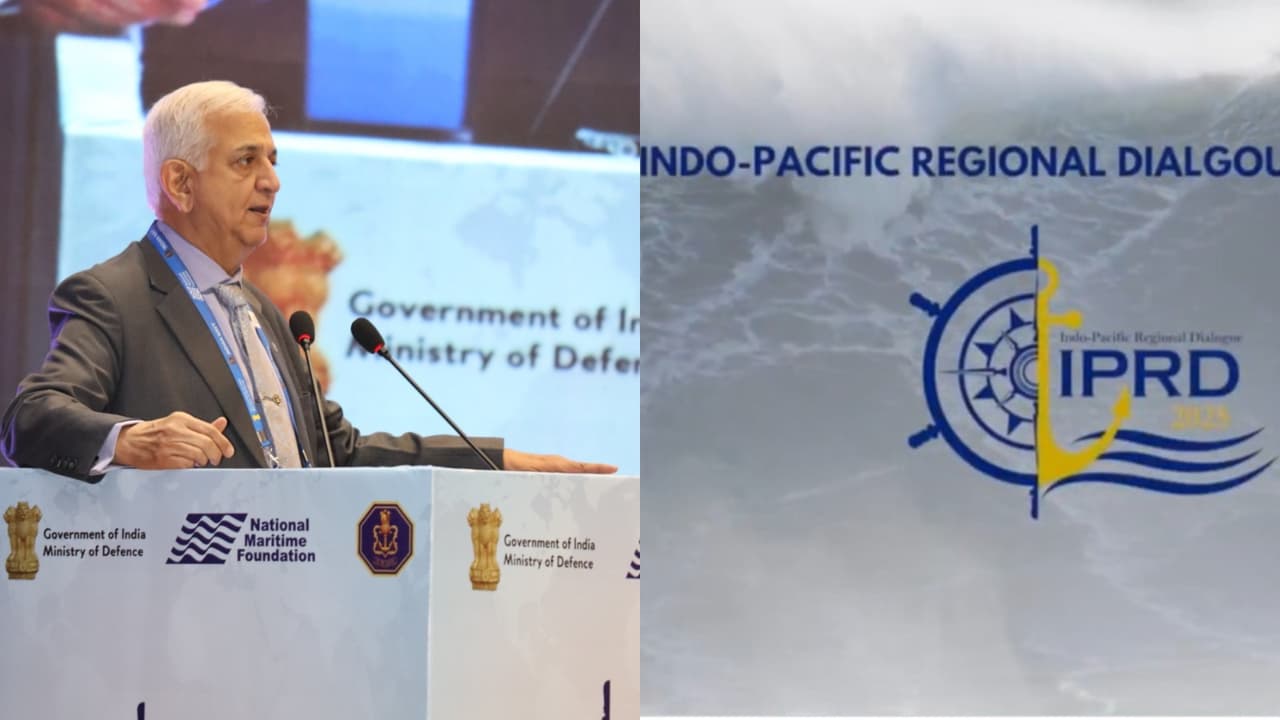Indo-Pacific Regional Dialogue, launched by Indian Navy in 2018, serves as a key platform for regional cooperation and maritime understanding. Conceived as a ‘listening forum’, it explores all dimensions of security.
New Delhi: When the Indian Navy first launched the Indo-Pacific Regional Dialogue (IPRD) in 2018, the term Indo-Pacific had already begun to migrate from maps to mindsets. It had moved beyond biogeography into geopolitics, drawing together an oceanic expanse that runs from the shores of Africa to the Pacific islands, from the southern edge of Eurasia to the northern limits of Antarctica.
Few concepts had expanded so quickly, and fewer still demanded as much clarity.
The Director-General of the National Maritime Foundation (NMF), Vice Admiral Pradeep Chauhan (Retd), recalls that the time was ripe for India to provide that clarity.
“By 2018, the term ‘Indo-Pacific’ had acquired very considerable traction,” he says. “Its spatial extent was predominantly maritime, encompassing West Asia, Africa, the Indian Ocean in its entirety, Southeast Asia, East and Northeast Asia, Australia, and the island nations of the Southern Pacific.”
The challenge, he explains, was that this newly imagined geography was not a static region – it was a dynamic system of connections. “Economic and security connectivity between the Indian and the Pacific oceans are so extensive and intensive that they can be sensibly considered only as a single strategic system,” he stated.
Scroll to load tweet…
A Platform for Listening
The IPRD, he says, was conceived not as another grandstanding conference, but as a listening platform – a space for nations to speak to one another, not past one another. “It remains essential that connectivity, cooperation and collaboration should always trump competition, confrontation and conflict,” Vice Admiral Chauhan observes.
The first step, he adds, was deceptively simple: listen. “All of us connected by this regional construct needed to listen to one another, to understand and appreciate the perspectives that drove our respective strategies – security, economic or cultural.”
That act of listening became the founding principle of IPRD.
It turned the forum into what Chauhan calls “the Indian Navy’s international outreach to the region at the strategic level” – a maritime complement to India’s premier foreign policy platform, the Raisina Dialogue.
Security in All Its Dimensions
Unlike many strategic dialogues that focus narrowly on defence, IPRD was designed to explore security in all its dimensions.
Vice Admiral Chauhan reminds us that “security is far more than military security alone.” He lists its multiple facets – economic, human, environmental, political, and societal – all of which converge in the maritime domain.
“Military security may be the most important,” he concedes, “but it is only one among many.” That broader vision has become IPRD’s trademark: where admirals, academics, diplomats and entrepreneurs discuss the same ocean from different vantage points.
Each edition of IPRD tackles a different aspect of the Indo-Pacific Oceans Initiative (IPOI) – the seven-pillar framework announced by Prime Minister Modi in 2019. These pillars, or “seven maritime lines of thrust,” range from connectivity and ecology to capacity building and resource sharing.
From Concept to Connectivity
Vice Admiral Chauhan describes IPOI as “a deeply interconnected web of seven spokes.” Each annual IPRD, he explains, focuses on one or more of these spokes – building “second-order and third-order specificity” to translate broad ideas into concrete policy recommendations.
This process-driven approach, he says, is what gives IPRD its “contemporary and enduring relevance.” It allows the Navy and NMF to identify actionable pathways that can later be recommended to the Government of India – from building regional maritime domain awareness networks to enhancing blue economy partnerships.
In practical terms, this means that the IPRD does not end when the dialogue concludes. Its outcomes ripple into future initiatives – influencing training exchanges, cooperative frameworks, and even India’s positions in multilateral forums.
Restoring the Strategic Unity of the Indo-Pacific
For Chauhan, the Indo-Pacific is not a recent invention. It is a restoration of a much older reality – a world where the Indian and Pacific Oceans were part of one continuous system of trade, culture, and navigation.
He notes that for millennia, kingdoms and societies across Asia maintained “extensive and strong maritime-trade links and other forms of intercourse.” The modern Indo-Pacific concept, he argues, “restores this historical strategic unity.”
That perspective shapes India’s policy today: the Indo-Pacific is a strategic geography, not a strategic bloc. This distinction, central to India’s approach, allows New Delhi to promote inclusion over alignment – dialogue over deterrence.
A Maritime Supplement to Raisina
In less than a decade, IPRD has evolved from a naval conference into a maritime thought leadership platform of global standing. Its panels attract participation from across Asia, Africa, Oceania, and Europe – not merely as observers but as contributors. At each edition, discussions move beyond the conventional agenda of power politics into issues such as blue economy governance, maritime ecology, digital connectivity, and human resource development.
This, Vice Admiral Chauhan says, is precisely what makes it unique. “Through the international recognition that this conference has acquired, the Navy is able to identify and recommend how each of the seven maritime lines-of-thrust may best be translated into meaningful and mutually beneficial action across the entire region.”
That, he adds, is why IPRD has been described as “the maritime supplement to the Raisina Dialogue.” It is not merely about what India says – it is about what India helps others say.
